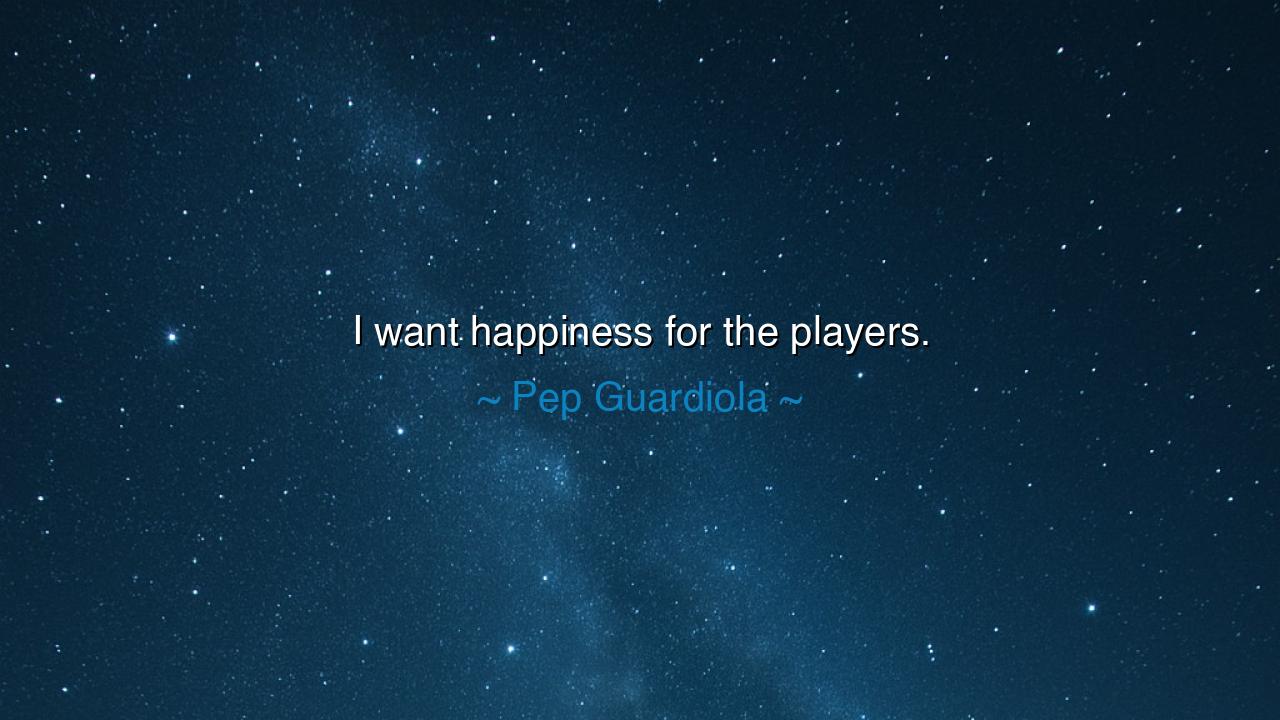
I want happiness for the players.






Hear, O lovers of purpose and harmony, the words of Pep Guardiola, the philosopher of the modern game, who declared: “I want happiness for the players.” Though these words seem simple, they carry within them the weight of ancient wisdom — for they speak of leadership not as domination, but as care; not as authority, but as the art of uplifting others. In this brief utterance lies the truth that the greatness of any group — whether a team, a people, or a nation — depends not merely on talent or triumph, but on the joy that animates its members. For happiness is not a luxury in labor, but its sacred fire.
The origin of these words lies in Guardiola’s way of leading — a man who, though born upon the field of sport, became a teacher of the human spirit. From his days as a player under Johan Cruyff, he learned that football, like life, is a dance of harmony and intelligence — a collective rhythm, not an individual conquest. As a manager, he carried this philosophy forward: the belief that only when a player’s heart is free and happy can their mind create beauty. To Guardiola, tactics are the language of the body, but happiness is the music of the soul. Without it, even victory tastes hollow.
The ancients too understood this truth. When Pericles led Athens during its golden age, he sought not only to make the city powerful, but to make its citizens content in their purpose. He said that the true strength of a state lies not in its armies, but in the flourishing of its people. In the same spirit, Guardiola sees that the strength of his team lies not in fear or discipline alone, but in joy, in unity, in the sense that every man plays not as a machine, but as a living part of a greater song. The players’ happiness becomes the foundation upon which courage, creativity, and excellence are built.
For when a man feels valued, when he labors with love and trust, he rises beyond duty into inspiration. Look to the Barcelona of Guardiola’s reign — a symphony of movement, where each pass was an act of understanding, each goal a manifestation of shared vision. It was not merely a team; it was a brotherhood of belief. The secret behind their mastery was not only skill, but joy — the freedom to express, to play, to belong. Thus, when Guardiola says, “I want happiness for the players,” he is speaking as the shepherd speaks of his flock — for he knows that only the serene heart can sustain greatness.
And yet, this philosophy is not without its trials. The world often mistakes happiness for comfort, or indulgence. But what Guardiola seeks is a deeper form of joy — the kind born of discipline, unity, and purpose. The ancients called this eudaimonia, the flourishing of the soul through the pursuit of excellence. He does not promise his players ease; he demands their best. But he understands that the best cannot be drawn from fear. True mastery is born from love — love of the craft, of the team, of the shared dream. A coach who leads by joy builds warriors whose strength endures; a leader who leads by fear breeds victory that withers.
Consider the contrast of Alexander the Great, who conquered the known world through brilliance and charisma. His men followed him not merely because of his orders, but because of his spirit — because he cared for them, ate beside them, bled beside them. They fought for him as much as for themselves. So too does Guardiola lead — not from the throne, but from the heart. His desire for his players’ happiness is not weakness, but strength; for it is the power that binds men together, transforming labor into art and struggle into purpose.
Let this be the lesson, then, for all who lead and all who follow: seek not only success, but joy in the journey. In your teams, your families, your communities — cultivate the kind of happiness that comes from shared effort and mutual respect. Remember that greatness is not built upon fear, but upon trust. And when those beside you flourish, your own spirit grows bright.
So, take these words of Pep Guardiola as a teaching of timeless truth: a leader’s duty is not only to shape victory, but to nurture joy. For the happiest worker creates the finest work; the happiest warrior fights with the purest strength. And when the heart smiles, the hands achieve miracles. Thus, may every leader say with wisdom and humility — “I want happiness for the players,” — and may every player, every soul, find in that happiness the courage to become more than they ever dreamed to be.






AAdministratorAdministrator
Welcome, honored guests. Please leave a comment, we will respond soon